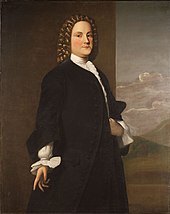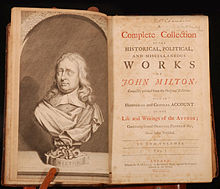Thomas Birch (historian)
Thomas Birch (born November 23, 1705 in Clerkenwell , † January 9, 1766 in London ) was an English historian and writer .
Life
Thomas Birch was born in Clerkenwell in 1705 as the son of Joseph Birch, a manufacturer of coffee grinders . After completing his schooling, Thomas preferred university to business life , but since his parents were Quakers , this option was initially denied to him. However, later sources speak of an MA at Marischal College in Aberdeen . Despite these circumstances, he was ordained a Deacon of the Church of England in 1730 and a priest in 1731. In addition, the clad Reverend a vicar place in ulting , Essex , and the rector of St. Gabriel, Fenchurch Street, London (1746) and in Depden , Essex (1761).
As a firm supporter of the Whigs , he gained the support of Philip Yorke, 1st Earl of Hardwicke , later Lord Chancellor . He owes his later career in many ways to this friendship. Thomas Birch had a number of benefices in various counties and areas, even in London . In 1735 Birch was appointed a member of the Society of Antiquaries. He was also an elected member of the Royal Society , where he served as its secretary and chronicler from 1752 to 1765 ( The history of the Royal Society of London for improving of natural knowledge , 1756 ).
He had married Hannah Cox as early as 1728, but she died the following year. He himself passed away on January 9, 1766 after falling from a horse. He found his grave in the church of St. Margaret Pattens , in London, of which he was rector during his lifetime. He died, according to his earlier expressed will, "in a full confidence in the Mercy and Goodness of almighty God and with a firm persuasion of a blessed Immortality discoverable by the Light of Nature and confirmed for us Christians by that of Revelation". He left his records and books in his will to the British Museum, as well as a sum of £ 500 to raise the salaries of the three assistant librarians .
plant
Birch handled an enormous amount of work as a writer and was involved in a large number of literary projects. While many of them have been scientifically arid, the noteworthy utility of some works is considerable. However, the man of letters and literary critic Horace Walpole questioned his taste and judgment in parts. Regardless of this, Birch published numerous biographies and overviews of works by important English scholars, writers and statesmen, for example Edmund Spenser , Francis Bacon , John Milton , William Chillingworth (1602–1644), Robert Boyle , John Thurloe , Walter Raleigh and John Tillotson ( 1630-1694).
Thomas Birch conducted extensive correspondence with the leading men of his era. Some of his letters have appeared in Literary Anecdotes of the 18th Century (London, 1812–1815) and Illustrations of the Literary History of the 18th Century (London, 1817–1858) by John Nichols , in the Bibliotheca Topographica Britannica , vol. iii. (London, 1780-1790), and in James Boswell's Life of Johnson .
Samuel Johnson wrote of him: “Tom Birch is as brisk as a bee in conversation; but no sooner does he take a pen in his hand, than it becomes a torpedo to him, and benumbs all his faculties ". - “Tom Birch is as brusque as a bee in conversation; but as soon as he has a pen in hand, he becomes a torpedo that encompasses all of his abilities. "
Thomas Birch wrote most of the biographies in General Dictionary, Historical and Critical , 10 vols. (London, 1734–1741), assisted in the compilation of the Athenian Letters (London, 1810), edited the State Papers of John Thurloe (London, 1742) and the State Papers of W. Murdin (London, 1759). He also wrote Life of the Right Honorable Robert Boyle (London, 1744); Historical view of Negotiations between the Courts of England, France and Brussels 1592-1617 (London, 1749); Life of Archbishop Tillotson (London, 1752); History of the Royal Society of London (London, 1756-1757); Life of Henry, Prince of Wales (London, 1760), and several other works. Some of his posthumous papers were published as the Court and Times of James I and the Court and Times of Charles I as late as 1848 .
The American scholar Alan Houston found a collection of manuscripts in the British Library with the title Copies of Benjamin Franklin's Letters relating to the March of General Braddock . Birch was said to have obsessively copied every historical document he held in his hands. Thomas Birch was friends with Benjamin Franklin and both were members of the Royal Society. In his autobiography , Franklin referred to his Quire Book , which was never found, but he described it as containing letters and documents dealing with his attempts to support the British government in the pre-revolutionary period. In 1755 he tried to help the British Redcoats, led by General Braddock , who were supposed to drive the French out in Fort Dusquesne (in today's Pittsburgh ). Braddock was in dire need of transportation for his troops. Franklin raised horses and wagons for him by using his diverse relationships as Pennsylvania's leading politician. Nevertheless, Braddock was defeated by the French and their Indian allies in the battle of the Monongahela .
- Selection of his writings
- A general dictionary historical and critical , ed. Birch. 10 vols, 1734-41.
- A complete collection of the historical, political and miscellaneous works of John Milton , ed. Birch. 2 vols, 1738.
- The life of Mr. William Chillingworth . 1738.
- The complete works of Francis Bacon , ed. Birch. 4 vols, 1740.
- General Dictionary, Historical and Critical , 10 vols., London, 1734-1741.
- A Collection of the State Papers of John Thurloe. London, 1742.
- An account of the life and writings of Ralph Cudworth . 1743
- The Works of the Right Honorable Robert Boyle. London, 1744. Accessed October 3, 2012.
- An inquiry into the share which King Charles I had in the transactions of the Earl of Glamorgan, afterwards Marquis of Worcester, for bringing over a body of Irish rebels to assist that king in the years 1645 and 1646. London 1747.
- Historical view of Negotiations between the Courts of England, France and Brussels 1592-1617. London, 1749. Accessed October 3, 2012.
- The life of Mrs. Catherine Cockburn. 1751.
- The life of Mr. Edmund Spenser. 1751.
- The works of Sir Walter Raleigh , ed. Birch. 2 vols, 1751. Text of the 1829 edition on google.books.com . Accessed October 3, 2012.
- The heads of illustrious persons of Great Britain, engraven by Mr. Houbraken. With their lives and characters. A. and J. Knapton, London 1752.
-
The life of the Most Reverend Dr. John Tillotson, Lord Archbishop of Canterbury. London, 1752. Accessed October 3, 2012.
- Life of the noble Mr. D. Johann Tillotson, Lord Archbishop of Canterbury. Weidmann, Leipzig 1754.
- Thomas Birch: Memoirs of the Reign of Queen Elizabeth from the Year 1581 till her Death. In which the secret intrigues of her Court, And the conduct of her favorite, Robert Earl of Essex, both at Home and Aboard are particularly illustrated. , Volume I 1754.
- Thomas Birch: Memoirs of the Reign of Queen Elizabeth from the Year 1581 till her Death. In which the secret intrigues of her Court, And the conduct of her favorite, Robert Earl of Essex, both at Home and Aboard are particularly illustrated. (pdf), Volume II 1754 (accessed on October 2, 2012). on Google Books.
- The life of Dufresnoy. 1754.
- The history of the Royal Society of London for improving of natural knowledge. London, 4 volumes, 1756–1757. Accessed October 3, 2012 at google.books.com .
- State Papers of W. Murdin. London 1759.
- Life of Henry, Prince of Wales. London 1760. Accessed October 3, 2012.
- Letters, speeches, charges, advices, etc of Francis Bacon , ed. Birch. 1763. Accessed October 3, 2012.
- An account of the life of John Ward, Professor of Rhetoric at Gresham College . 1766.
- The court and times of Charles the First; illustrated by authentic and confidential letters, from various public and private collections; including Memoirs of the mission in England of the Capuchin friars in the service of Queen Henrietta Maria. London 1848. Accessed October 3, 2012.
- Court and Times of James I. London 1848. Accessed October 3, 2012.
literature
- WP Courtney , Dictionary of National Biography , vol. v. (1886)
- Andrew Kippis , Biographia Britannica (London, 1778–1793)
- Horace Walpole, Letters (London, 1891).
Web links
- Entry to Birch; Thomas (1705 - 1766) in the Archives of the Royal Society , London
- Thomas Birch: The Life of Mr. Edmund Spenser . 1751 On: spenserians.cath.vt.edu. Accessed October 3, 2012.
Individual evidence
- ↑ Short biography of Thomas Birch ( page no longer available , search in web archives ) Info: The link was automatically marked as defective. Please check the link according to the instructions and then remove this notice. . On: spenserians.cath.vt.edu. Accessed October 3, 2012.
- ↑ From James Boswell : Life of Johnson: 1743, transmitted. Quoted from the 1820 edition, p. 68. Accessed October 3, 2012
- ↑ Inga Kiderra: Franklin Find: UC San Diego Researcher Discovers Trove of Founding Father's Letters . On: ucsdnews.ucsd.edu. April 23, 2009. Accessed October 4, 2012.
- ↑ As reported by CNN on April 25, 2009
- ^ Rene Chartrand: Monongahela, 1754-1755: Washington's Defeat, Braddock's Disaster . Osprey Publishing, 2004. ISBN 1-84176-683-6 . Paul E. Kopperman: Braddock at the Monongahela . University of Pittsburgh Press, 1977. [Reprints 1992, 2003]. ISBN 0822958198 ( digitized on the University of Pittsburgh Press website ) and Stanley M. Pargellis : Braddock's Defeat . In: American Historical Review 41: 2, 1936. pp. 253-269.
- ↑ Works by or about Thomas Birch in libraries worldwide (WorldCat catalog)
- ^ Samuel Johnson's review of The history of the Royal Society of London for improving of natural knowledge. ; “This book might, more properly, have been entitled by the author, a diary than a history, as it proceeds regularly from day to day, so minutely, as to number over the members present at each committee, and so slowly, that two large volumes contain only the transactions of the eleven first years from the institution of the society. I am, yet, far from intending to represent this work as useless. Many particularities are of importance to one man, though they appear trifling to another; and it is always more safe to admit copiousness, than to affect brevity. Many informations will be afforded by this book to the biographer. "
- ↑ See Johann Wolfgang Goethe's review, in: Goethe's selected works, Volume 35. Stuttgart 1868, pp. 175ff. The following can be learned from the documents presented “dryly and innocently”: “They reveal the dismembered manner with which the Society, according to its conviction, proceeded and delayed the sciences by endeavoring to promote them” (here p. 175 ).
| personal data | |
|---|---|
| SURNAME | Birch, Thomas |
| ALTERNATIVE NAMES | Birch, Tom; Birch, Tho. |
| BRIEF DESCRIPTION | English writer and historian |
| DATE OF BIRTH | November 23, 1705 |
| PLACE OF BIRTH | Clerkenwell |
| DATE OF DEATH | January 9, 1766 |
| Place of death | London |



